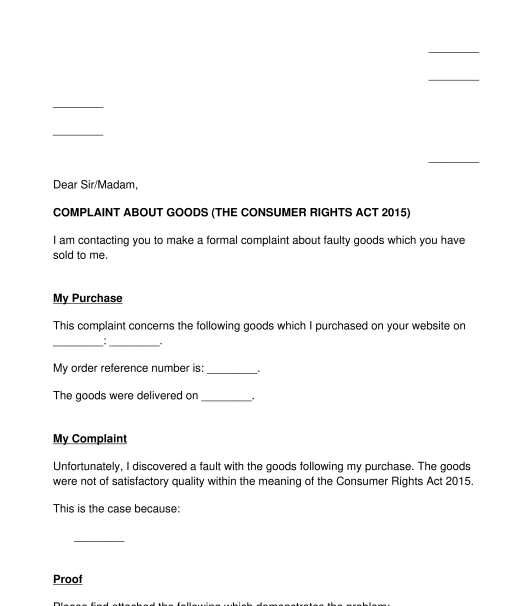 10/11/2025
10/11/2025

Answer a few questions and your document is created automatically.

Your document is ready! You will receive it in Word and PDF formats. You will be able to modify it.

 10/11/2025
10/11/2025
 Word and PDF
Word and PDF
 1 to 2 pages
1 to 2 pages
A consumer in the United Kingdom can use this document to raise a detailed formal, legal complaint that goods purchased by them from a business do not meet the requirements of the Consumer Rights Act 2015 and to request a formal remedy under the Act. This means that the goods breach the statutory rights of the consumer. If the goods have not been delivered, then a different letter should be used.
A consumer is an individual who purchases goods for personal use. Consumers have certain rights and protections.
Under the Consumer Rights Act 2015, goods sold to consumers must be:
- of satisfactory quality
- fit for purpose
- as described
- match a sample or model seen or examined
- installed correctly (where this is the trader's responsibility).
If goods do not meet the requirements of the Consumer Rights Act, a consumer has statutory remedies available to them. The available remedies will depend upon how long the consumer has had the goods in their possession when they raise the matter with the business. In summary:
If the goods are still faulty following the repair or replacement, the consumer can ask for a further repair or replacement or:
This letter can be used to complain about most goods which do not meet the required standard under the Consumer Rights Act 2015. The consumer can request a statutory remedy in the letter. It is important for the consumer to check whether any specific exceptions* apply to their goods before using this letter.
The consumer should also check any contractual terms which may apply to their purchase. For example, sometimes a business will have an extended returns policy which may be used without it being necessary to exercise a statutory right.
Examples of common exceptions: An exception to the above rules applies to motor vehicles. A refund may be subject to a deduction for reasonable use in relation to motor vehicles within the first 6 month period after purchase. Exceptions also apply to perishable goods.
The consumer should complete the document with all the relevant information about the goods including:
Questions will be asked about the remedy sought, which will be based on the period of time the consumer has had the goods for. Once the sender has completed the information, they should send the letter to the business. The letter may be sent by post or by email (or both). If the business fails to respond or does not provide a satisfactory response the sender may wish to escalate matters by:
The main legal provision which governs consumer rights is the Consumer Rights Act 2015.
You fill out a form. The document is created before your eyes as you respond to the questions.
At the end, you receive it in Word and PDF formats. You can modify it and reuse it.
A guide to help you: How to Send a Letter
Country: United Kingdom